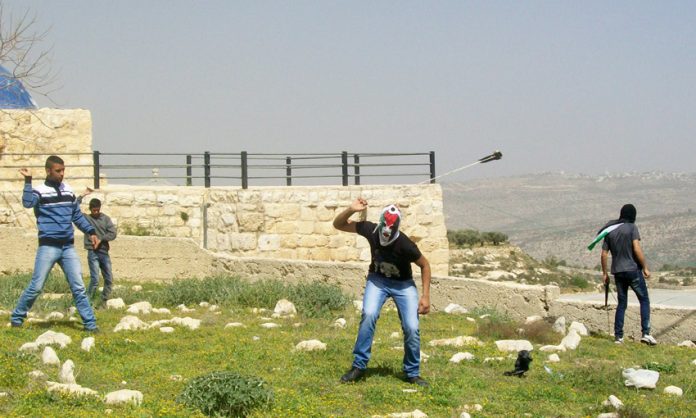US Secretary of State John Kerry on Tuesday blamed approval of Israeli settlements in East Jerusalem for derailing peace talks with Palestinians, a charge that angered Israeli officials.
The Israeli government announced a major expansion of settlement construction in the West Bank last month, just as Washington was trying to find a way to get the two sides to extend US-sponsored peace talks beyond an April 29 deadline.
While Kerry blamed intransigence on both sides, he told US lawmakers that a delayed Israeli plan to release several Palestinian prisoners as part of a good faith effort was sabotaged by the settlements move.
Kerry testified to the Senate Foreign Relations Committee: ‘In the afternoon, when they were about to maybe get there, 700 settlement units were announced in Jerusalem and, poof, that was sort of the moment.’
Israeli-Palestinian peace talks have teetered on the brink of collapse, with Washington fighting an uphill battle to get the two sides to agree to a framework proposal to extend the negotiations to the year’s end.
A Palestinian spokesman last month blamed the impasse on Israel’s West Bank settlement plans.
Kerry’s remarks were met with an angry response from Israel’s Economy Minister Naftali Bennett, who heads the far-right Jewish Home party.
Bennett said: ‘Israel will never apologise for building in Jerusalem. For many years the Palestinians tried with explosions and bombs to stop us being in the eternal capital of the Jewish people, it will not happen.’
The State Department, perhaps assessing the potential impact Kerry’s comments could have in the Middle East, rushed to explain that the secretary of state was trying to be fairminded in apportioning blame.
State Department spokeswoman Jen Psaki said: ‘John Kerry was again crystal clear today that both sides have taken unhelpful steps and at no point has he engaged in a blame game. He even singled out by name Israeli Prime Minister Binyamin Netanyahu for having made courageous decisions throughout the process.’
Kerry was also drawn into a heated exchange with Republican Senator John McCain, who declared the peace talks ‘finished’. While Kerry insisted that Israelis and Palestinians were keen on continuing the process, McCain cut in: ‘It is stopped.
‘Recognise reality.’ Kerry countered: ‘My hope is the parties will find a way back. We’re working with them to try to do so.’ He stressed there has been ‘a narrowing of differences’ between the two sides, although he would not elaborate.
• Meanwhile, the two sides met US Middle East envoy Martin Indyk late on Monday and are to see him again on Wednesday.
Kerry faced a grilling by the Senate Foreign Relations Committee over US foreign policy on several fronts, particularly Syria, where the Syrian Army has made gains against foreign- backed rebel positions in recent days in the three-year war that has left 150,000 people dead.
Republican Senator Bob Corker said: ‘We have no policy, from what I can tell, other than allowing people to kill each other off. Washington has failed to honour its commitments to support opposition groups.’
Kerry argued that the Obama administration was focused intently on resolving the Syria crisis. And while he conceded the Syrian Army has made gains he added: ‘I think there’s a capacity to change president Assad’s calculation, and so does president Obama. The key is, how do you get the parties to understand there isn’t a military solution?’
• Meanwhile, Israeli settlers on Wednesday assaulted Palestinian school children in the southern West Bank. A school principal said that a group of extremist Israeli settlers hurled stones at schoolgirls in the village of al-Tuwani, leaving them bruised.
Israeli soldiers stood by and watched without taking action as the settlers threw rocks, the principal said. The girls who sustained injuries were identified as Kifah Omar Abu Jundiyya and Dalal Awad Zein, both seventh graders. In al-Tuwani and other areas in the southern Hebron district, school children on a daily basis wait at checkpoints for Israeli soldiers to let them through locked gates.
Regardless of Israeli military presence, settler attacks on children en route to and from school remain commonplace, the principal said. In 2013, there were 399 incidents of settler violence against Palestinians in the occupied West Bank, according to the UN Office for the Coordination of Humanitarian Affairs.
Over 90 per cent of investigations into settler violence by Israeli police fail to lead to an indictment.
More than 500,000 Israeli settlers live in the settlements across the West Bank and East Jerusalem, in contravention of international law.
• Meanwhile, Israeli bulldozers on Wednesday demolished several Palestinian Bedouin houses in the Negev desert, locals said.
Police vehicles escorted bulldozers across the Negev as they demolished a number of structures in villages not recognised by Israeli authorities. In the village of al-Zaarura, bulldozers demolished two houses belonging to the Abu Judah family, witnesses said.
Locals in the village of Kseifa said that bulldozers demolished houses and tore down trees. Demolitions across the Negev are still ongoing, residents said on Wednesday afternoon. Israel refuses to recognise more than 35 Bedouin villages in the Negev, which collectively house nearly 90,000 people.
Many were founded before 1966, when Bedouins were concentrated on reserves by the state and ruled under martial law, as were all Palestinian citizens of Israel.
Israel denies them access to basic services and infrastructure, such as electricity, gas and running water, and refuses to place them under municipal jurisdiction. Some communities are subject to frequent demolitions by authorities.
The proposed Prawer Plan, which would have forcibly removed nearly 40,000 of these Bedouins from their homes in order to make room for Jewish settlements in the region, was taken off the agenda late last year after widespread protest by Palestinians.
